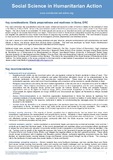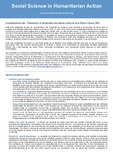Key Considerations: Ebola Preparedness and Readiness in Goma, DRC
Considérations clés : Préparation et planification de riposte contre le virus Ébola à Goma, RDC
| dc.contributor.author | Peyton, David | |
| dc.contributor.author | Gercama, Ingrid | |
| dc.contributor.author | Bedford, Juliet | |
| dc.coverage.spatial | Democratic Republic of Congo | en |
| dc.date.accessioned | 2019-03-26T10:23:36Z | |
| dc.date.available | 2019-03-26T10:23:36Z | |
| dc.date.issued | 2019-03 | |
| dc.identifier.citation | Peyton, D.; Gercama, I. and Bedford, J. (2019) Key Considerations: Ebola Preparedness and Readiness in Goma, DRC, UNICEF, IDS & Anthrologica | en |
| dc.identifier.citation | Peyton, D.; Gercama, I. and Bedford, J. (2019) Considérations clés : Préparation et planification de riposte contre le virus Ébola à Goma, RDC, UNICEF, IDS & Anthrologica | fr |
| dc.identifier.uri | https://opendocs.ids.ac.uk/opendocs/handle/20.500.12413/14422 | |
| dc.description.abstract | This brief summarises key considerations about the social, political and economic context of Goma in relation to the outbreak of Ebola in the DRC as of March 2019. Goma is the administrative capital of North Kivu province and a major urban centre in the Great Lakes Region. The city is home to an estimated 1.5 million people and serves as an important economic and transportation hub that links eastern Congo to the broader East African sub-region. The arrival of Ebola in Goma would substantially increase the at-risk population and heighten the potential for cross-border transmission to neighbouring countries, particularly Rwanda. This brief therefore focuses on local social and political structures that can be leveraged to promote preparedness and readiness actions. The brief is based on a rapid review of existing published and grey literature, personal communication with administrative and health officials in Goma, and lessons learnt from previous Ebola outbreaks. The brief was developed by David Peyton (Northwestern University) with support from Ingrid Gercama and Juliet Bedford (Anthrologica). Additional inputs were provided by Karen Büscher (Ghent University), Pat Stys (London School of Economics), Hugh Lamarque (University of Edinburgh), Martin Doevenspick (University of Bayreuth), Nene Morisho (Pole Institute), Kennedy Kihangi Bindu (Centre de Recherche sur la Démocratie et le Développement en Afrique), Jean-Benoït Falisse (University of Edinburgh), Rachel Sweet (Harvard Academy for International and Area Studies), Phuong Pham (Harvard Humanitarian Initiative) and colleagues from UNICEF, Médecins Sans Frontières and Translators without Borders. The brief is the responsibility of the Social Science in Humanitarian Action Platform. For further details on the issues contained in this brief and for contact details of associations and networks active in Goma, please contact Juliet Bedford (julietbedford@anthrologica.com). | en |
| dc.description.abstract | Cette note stratégique résume les considérations clés inhérentes au contexte social, politique et économique de Goma dans le contexte de la flambée épidémique d’Ébola survenue en RDC en mars 2019. Goma est la capitale administrative de la province du Nord-Kivu et un centre urbain majeur dans la région des Grands Lacs. La ville compte environ 1,5 million d’habitants et constitue un important centre économique et de transport qui relie l’est du Congo à l’ensemble des sous-régions d’Afrique de l’Est. L’apparition du virus Ébola à Goma augmenterait sensiblement la population à risque et contribuerait à renforcer le potentiel de transmission transfrontalière aux pays limitrophes, notamment le Rwanda. Par conséquent, cette note stratégique est axée sur les structures sociales et politiques locales qui peuvent être exploitées afin de promouvoir des actions de préparation et de planification. Cette note stratégique est basée sur une étude rapide de la littérature grise publiée existante ainsi que sur des communications personnelles avec des autorités administratives et sanitaires à Goma, et de l’expérience de précédentes flambées épidémiques d’Ébola. Elle a été élaborée par David Peyton (Université Northwestern) avec l’assistance d’Ingrid Gercama et Juliet Bedford (Anthrologica). Des contributions et remarques supplémentaires ont été fournies par Karen Büscher (Université de Gand), Pat Stys (London School of Economics), Hugh Lamarque (Université d’Édimbourg), Martin Doevenspick (Université de Bayreuth), Nene Morisho (Pole Institute), Kennedy Kihangi Bindu (Centre de Recherche sur la Démocratie et le Développement en Afrique), Jean-Benoît Falisse (Université d’Édimbourg), Rachel Sweet (Harvard Academy for International and Area Studies), Phuong Pham (Harvard Humanitarian Initiative) et des collègues de l’UNICEF, de Médecins Sans Frontières, du DFID et de Traducteurs sans frontières. La responsabilité inhérente à cette note stratégique revient à la Plateforme Social Science in Humanitarian Action (SSHAP). Pour obtenir des détails supplémentaires sur les questions contenues dans cette note stratégique, ainsi que les coordonnées des associations et réseaux actifs à Goma, veuillez contacter Juliet Bedford (julietbedford@anthrologica.com). | fr |
| dc.description.sponsorship | UNICEF | en |
| dc.language.iso | en | en |
| dc.publisher | UNICEF, IDS & Anthrologica | en |
| dc.rights.uri | http://creativecommons.org/licenses/by-nc/4.0/ | en |
| dc.subject | Health | en |
| dc.title | Key Considerations: Ebola Preparedness and Readiness in Goma, DRC | en |
| dc.title | Considérations clés : Préparation et planification de riposte contre le virus Ébola à Goma, RDC | fr |
| dc.type | Other | en |
| dc.rights.holder | Anthrologica | en |
| rioxxterms.funder | Default funder | en |
| rioxxterms.identifier.project | Default project | en |
| rioxxterms.version | NA | en |
| rioxxterms.funder.project | 9ce4e4dc-26e9-4d78-96e9-15e4dcac0642 | en |



